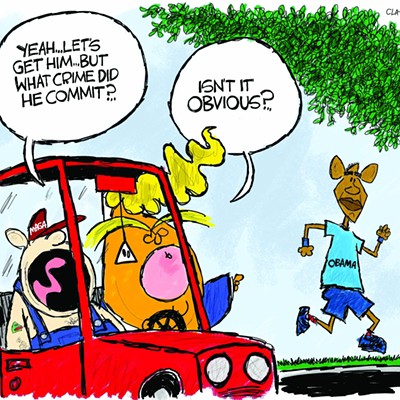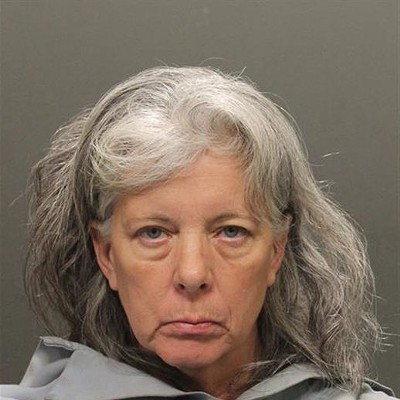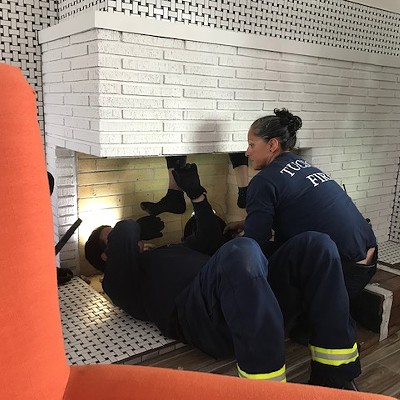The flights 500 feet above the city cost taxpayers almost $1.2 million in operating expenses this fiscal year. For that money they get seven pilots, a supervisory sergeant and two mechanics to fly and maintain one of three Bell helicopters, the newest of which was purchased last year for $1.6 million.
The air support program was involved in about 600 out of a total of 25,700 calls made to TPD in February. Of those, the helicopter assisted with 56 arrests. Annually, more than $1,600 is spent on every helicopter-assisted arrest.
It is tax money well spent, according to Lt. Perry Tarrant, tactical support unit commander for TPD. He calls the helicopters a "force multiplier" and says they increase safety for officers on the ground, outrun fleeing vehicles, see a much bigger picture of what is going on at a crime scene and can help the fire department. He stresses that the helicopter can get across town quickly, but admits it is first on the scene less than half the time.
Despite those arguments, some Tucsonans have been highly critical of the program, which began in May 1972 as a six-month "test." Tucson was the first community in Arizona to have police helicopters. At an October 1972 public hearing to discuss continuing the flights, 300 people turned out, two-thirds of them opposed, and a petition with 6,515 signatures to end the operation was presented to the City Council.
Backers of the helicopters also turned in a petition, with 1,529 signatures. The Arizona Daily Star reported, "Speakers in favor of the helicopters said the copters are effective in reducing crime, saving lives and in making the job of policemen less dangerous." But on the other side, according to the Star, "One speaker called the helicopters, 'noisy, expensive, dangerous, snoopy and a misuse of funds for any government in a free society.'"
Ignoring the pleas of the critics, the council continued the program and complaints about it have generally faded. Midtown home owner Margaret Turnbull is one of only a handful of people now objecting.
When she hears the noise above her home, Turnbull calls the police to ask what is going on. "I feel like this stupid thing is flapping around in the sky and I need a big flyswatter."
Turnbull says the TPD helicopter seems to be in her area frequently, often between 10 p.m. and 2 a.m. responding to loud parties, and that many of her neighbors hate it also. "I never hear the loud parties," the 26-year-old UA graduate student emphasizes, "but the helicopter wakes me up."
Tarrant said the helicopter mostly responds to calls concerning vehicle or foot pursuits by officers on the ground, stolen cars or rapes. Because of where she lives, he thinks Turnbull often hears medical helicopters instead of TPD's.
Disputing that, Turnbull says it is a combination of loss of sleep and anger at spending taxpayer dollars to respond to non-life-threatening calls that frustrates her the most. "I'm more than willing to listen to the noise if it is involved with saving a life," she says, but referring to annual police arrest statistics, "only about 7 percent of the time when people hear the helicopter are they actually accomplishing something." Plus, she adds, "when the searchlight is in my backyard, it feels like a scene from 1984."
TPD's Tarrant says he has only received complaints from six people in the past 12 months. Instead of abolishing the program, Tarrant believes it should be extended to include daylight hours. He proudly points out that Tucson is host and co-sponsor of this year's "Airborne Law Enforcement Association" conference to be held in July.
Based on what she knows of the program, Turnbull has a different perspective. Her conclusion: "It is absolutely not a good use of public money." She wonders how many ground units the city could afford with the same amount of money.
Costs versus benefits of the helicopter was an issue raised in a May,1990 Tucson Weekly article written by Jim Malusa. He questioned whether the program was better than the 65 police cruisers that could have been purchased for the $954,000 price of the two helicopters the department then had.
Despite the cost and low level of assisted arrests in which the TPD helicopter is involved, Ken Goodman, president of the Blenman-Elm neighborhood in which Margaret Turnbull lives, disagrees with the idea of replacing them with more ground patrol units. "I think giving up the helicopters would be a major mistake," he says.
But Turnbull argues, "We have to stop giving the cops everything they want because they can't back up their requests with statistics that are valid. If they can't produce statistics in [the city's upcoming] budget review, they shouldn't be allowed to keep the helicopter program."
Based on his experience, Jim Malusa concluded the program wasn't about arrest statistics. Having ridden the choppers, he wrote, "I understand a little better what the police helicopter is about: power ... It is a fantastic racket deemed necessary simply because you never know when that bump in the night may in fact bump you off."












